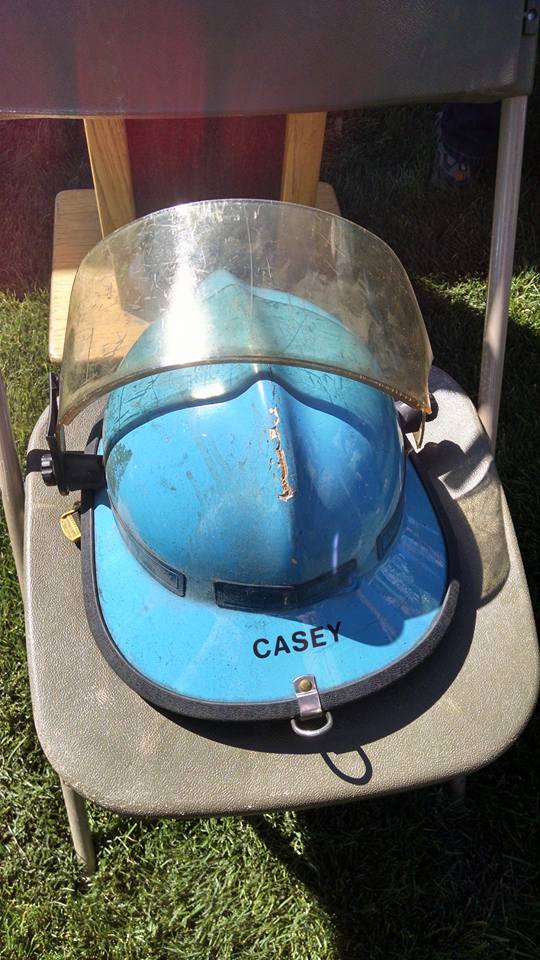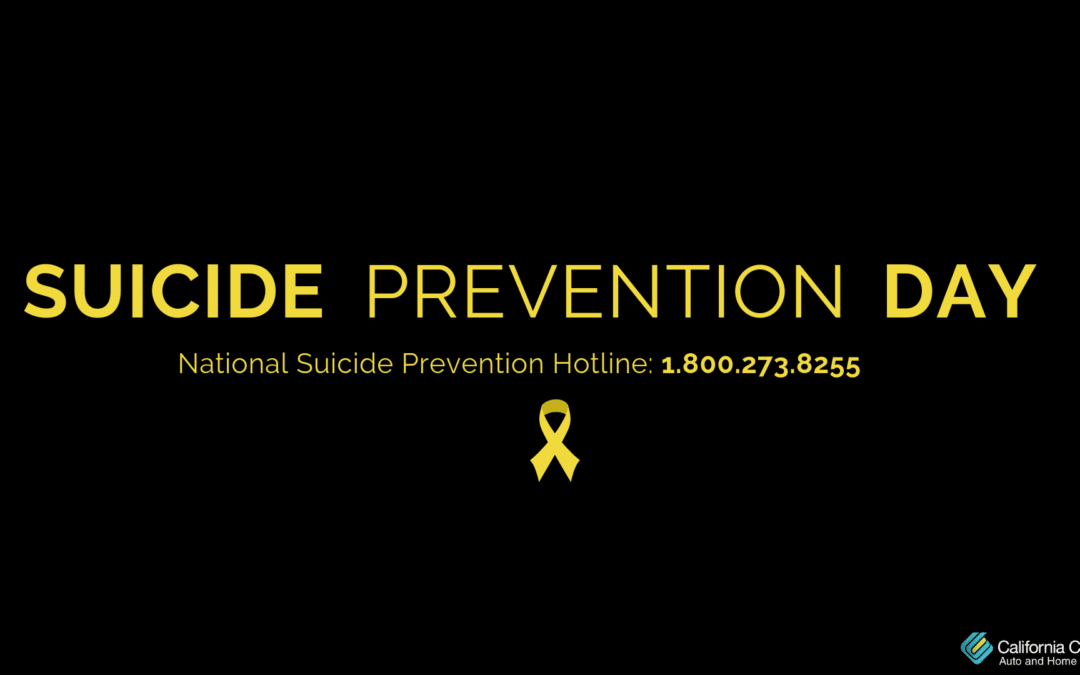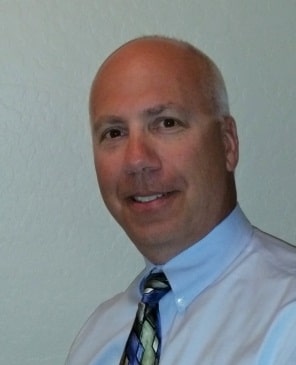By Mark Goldberg, Communications Specialist with California Casualty
September 10th is World Suicide Prevention Day, and many people don’t like to talk about it, but it’s time to start.
The topic of suicide got a lot more personal for me four years ago when a good friend and retired firefighter, Tim Casey, took his life. Tim had written for the California Casualty blog about his life as a firefighter and the scars (both physical and mental) he carried from his 30 years as a first responder. His moving articles about mental health and PTSD in the fire service are real eye-openers.
I knew Tim had his struggles; he admitted that he was a recovering alcoholic, haunted by the things he saw on the job. He battled PTSD and the desire to drown those images in a bottle of booze, but on the outside, it appeared things were looking up for Tim. He was engaged to a wonderful woman, was very involved in spreading awareness about first responder suicides, and was teaching at one of the local universities. The last time I talked with Tim he seemed upbeat and happy, but I guess the demons were stronger than I or many others knew.
The Growing Problem of First Responder Suicide

And that’s a problem; firefighter ranked second in CareerCast’s annual survey of the most stressful jobs for 2019, right after soldiers. Being a police officer ranked fourth on the list.
Both jobs are dangerous, with constant life-threatening situations and unspeakable tragedies. One can only imagine how the searing image of injury and trauma can impact a person.
The daily stress, combined with limited opportunities to talk about it, is taking a toll. 243 first responders committed suicide in 2018- and that number is only predicted to rise through 2019, with many others suffering PTSD. It’s a problem these professions can’t afford to ignore.
Help for First Responders
Suicide was a little-discussed topic by fire departments until Captain Jeff Dill created the Firefighter Behavioral Health Alliance (FBHA). Dill started the nonprofit after hearing about the emotional impact the World Trade Towers disaster had on firefighters in 2001 and talking with first responders about lack of mental health resources for those returning from the devastation of Hurricane Katrina in New Orleans. Captain Dill thinks the number of firefighter suicides that get reported is only the tip of the iceberg. He formally began the nonprofit in 2011 to directly educate firefighters/EMS personnel and their families about behavioral health issues, such as depression, PTSD, anxiety, and addictions – as well as firefighter suicides.
We recently had a chance to talk with Chief Dill about the FBHA and the mission of suicide prevention among the men and women who protect us. Dill also knew Tim Casey.
Tell us a little bit about yourself and FBHA.
I am a recently retired fire officer with over twenty-five years in the fire service, Master’s Degree in Counseling and founder of Firefighter Behavioral Health Alliance (FBHA). I can tell you from experience that looking into ourselves is very difficult.
FBHA is the only known organization that tracks and validates firefighter & EMT suicides in the U.S. We never use names or organizations unless families give us permission. We do take the known information and present workshops across N. America to educate our brothers and sisters.
How does FBHA reach out to Fire/EMS?
We help fire/ems departments learn how to recognize when a coworker is struggling and how to reach out to that person. We had two themes for our workshops until recently. The two were “Challenge With Compassion” and “Be Direct”. The premise was if you see someone struggling, acting different or hear things from them, then you need to Challenge with Compassion and Be Direct in your approach.
We know that people actually see us better than we see ourselves, so listen to them when they tell you “you’ve changed.” I have added the term that so many people have now heard this past year in our workshops, and that is we must do – an “Internal Size-Up”.
This simply means, what is going on in your life? Could these issues become monumental to the point that we become depressed, anxious, create suicidal ideations or become addicted to some type of vice? At times, we subconsciously begin to act in ways that only others can see. So when someone says to you “what is going on with you?” please do not take offense, take a look at your life!
Why is it so hard for first responders to ask for help?
In every workshop we deliver we talk about Traditional Brainwashing. This quite simply means we become a product of our training, experiences and historical beliefs. From our first days in either fire or EMS academies, we are taught everything to become confident and competent firefighters and EMT’s, yet, the greatest error is the lack of behavioral health.
The instructing of horrific things you will see and how they might play out in your life for a lifetime. The stress, anxiety, depression, sleep deprivation, PTSD and relationships that might go south leading to a high rate of divorce are all real issues we face yet never taught because it is a negative for our traditions! We are afraid to talk about it because we are taught not to.
When things are going rough for you then the greatest thing you can do for yourself is to listen. When people, who see us from a different point of view than ourselves, notice that something is different, then maybe it is time to look at our lives by performing an Internal Size-Up. This means seek professional help, talk to a chaplain, peer support or just a friend.
We, in the fire and EMS service, must remember we are human beings first. We are performing to standards that the general public will never understand. We are seeing things the general public will never see. So listen to others because maybe they are seeing things in us we will never see!
Stay safe!
Jeff Dill, Founder of Firefighter Behavioral Health Alliance – NPO (FBHA)
Thank you, Chief Dill, for your time.
Resources for First Responders in Crisis
So, what can we do? First, take the time to ask questions and offer help to a first responder who appears to be stressed, depressed or hurting. In one of his articles for California Casualty, Tim said if someone had really taken the time to press him, to ask him what he was feeling, he probably would have cracked and exposed his hurt. The sad truth is, maybe Tim or a first responder you know, was one conversation away from still being here with us.
More and more resources are being created to help first responders deal with and talk about the stresses of their jobs. The Firefighter Behavioral Health Alliance is a great first step, with information and links to support agencies. Other groups are now offering help for first responders in crisis:
- Safe Call Now – providing a confidential, comprehensive 24-hour crisis referral service for public safety members, 206-459-3020, safecallnow.org
- HelplineEmergency Ministries – providing chaplains for first-responder counseling and support, emergencychaplain.org
- Rosecrance Florian Program – offering substance abuse treatment and PTSD support for uniformed personnel, https://rosecrance.org/addiction-treatment/florian-program/
- NVFC Fire/EMS Helpline, 1-888-731-FIRE
- American Academy of Experts in Trauma Stress – collaborating with organizations to meet the needs of victims and survivors, aaets.org
- The Code Green Campaign – advocating for mental health awareness and education for first responders on how to provide care for themselves and their peers and reduce the stigma preventing people from admitting they have a problem and not seeking help, https://codegreencampaign.org
- Blue H.E.L.P – dedicated to reducing mental health stigma through education, advocate for benefits for those suffering from post-traumatic stress, acknowledge the service and sacrifice of law enforcement officers lost to suicide, assist officers in their search for healing, and bring awareness to suicide and mental health issues, https://bluehelp.org/
The goals of organizations like these is to raise awareness of the problem, end the stigma, and to find support for every firefighter and first-responder in need. But, if we don’t talk about the problem, we can’t solve it.
If you know a first responder, maybe someone you love, start the discussion. Ask them what they are feeling, how they are dealing with the stress of the job, and offer help. If you’re thinking there’s not a good time to bring up the subject, remember that this is also Suicide Prevention and Awareness Month. Too many good men and women, our protectors, are ending up as statistics in the battle against suicide.
If you or someone you love is having depressed or suicidal thoughts call the National Suicide Prevention Hotline at 1.800.273.8255.
- Graduation – When to Remove Your Child from Your Auto Policy - May 18, 2023
- How to Prevent Catalytic Converter Theft - May 17, 2023
- How Much Does Home Insurance Cost? - May 17, 2023



